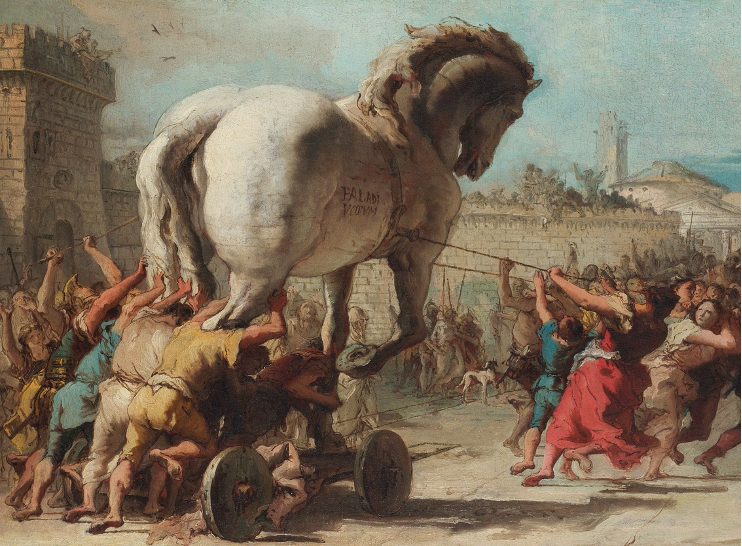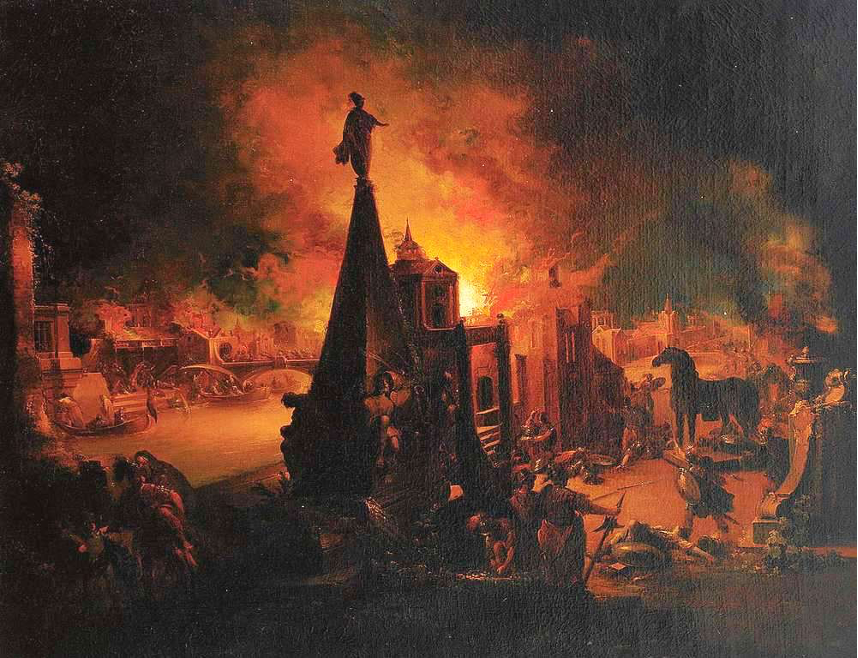I am endlessly fascinated by strategy—by the ability to manipulate events in order to achieve the maximum result with minimum effort. The Taoists refer to this talent as wu wei (literally ‘non-action’ but more accurately translated as ‘effortless action.’) Anyone can win a contest if they hold in their hands all the good cards. You don’t need much strategy if you are better, stronger, and enjoy all possible advantages. Strategic brilliance is the ability to win when you don’t have the good cards, when you are—literally or metaphorically—outnumbered and outgunned. In the classic The Art of War, good ole Sun Tzu made this point abundantly clear. “Winning one hundred victories in one hundred battles is not the pinnacle of skill. The pinnacle of skill is found in defeating the enemy without even fighting.”
It sure sounds wonderful in theory, but how can one achieve this seemingly magical ability? Of course, this skill is a bit more complicated than simply following some fixed rules. But Sun Tzu gives us a clue, “All warfare is based on deception.” According to Taoist thought, whereas everyone understands the power of strength, the most reliable tool to achieve lasting victories is subtlety. In Taoist lingo, yang energy is associated with strength, toughness, assertiveness, explosive effort and a kind of power that is obvious to all. Yin energy, instead, is subtle, yielding, mysterious and gets stuff done in a way that isn’t flashy or dramatic. The heart of Sun Tzu’s Art of War is all about learning the power of yin.
One could easily make the argument that the entire story of the Trojan War narrated by Homer and Virgil is a masterclass demonstrating this point. The tale tells us that for ten long years the Greeks had attacked the city of Troy with everything they had. They had won battles, had killed Hector, the greatest of Trojan warriors, and yet victory still eluded them. The most renowned Greek heroes—from Achilles to Agamemnon, Ajax to Diomedes—had given their all, but after ten years of frontal attacks they had little to show for their efforts. They had exerted all the yang energy they could muster—to no avail.
Enters the power of yin.
All Greek warriors celebrated by Homer were primarily famous for their bravery, toughness, and skill in open battle. Take Ajax, for example. As I once wrote in the book On the Warrior’s Path, “Ajax, an unshakable mountain, full of pride and of his boundless strength, ready to fight face to face against an entire army.” But after ten years of failures, victory in the Trojan War doesn’t arrive thanks to any of them. It comes from Odysseus. If the others are the Greek equivalent of honorable samurai who fight in the open, Odysseus is the Greek equivalent of a ninja: “Silent and unseen, he achieves what ten thousand warriors charging straightforward cannot accomplish.” Don’t get me wrong—Odysseus is no slouch in the bravery, toughness, and fighting abilities department, but also possesses talents the rest of the Greek warriors lack. He is a strategic genius. Whereas Ajax, Achilles & Co. only understand yang energy, Odysseus is also a master of yin. He is smart and uses his wits to achieve what others failed to gain with brute force. It is Odysseus, in fact, who comes up with the idea that will turn the tide of the war, the Trojan Horse.
One morning, the Trojans wake up to find out their enemies who have been besieging them for ten years are gone. The Greeks seem to have given up, taken down their camps and sailed back home. The only thing they left behind was a giant wooden horse they created as an offering to the goddess Athena, praying for a safe return home. The Trojans decide to steal the offering for themselves and bring it inside their city.
Some of them smell trouble. Cassandra, one of the daughters of King Priam, had the gift of prophecy and warns that the horse will bring death and destruction to Troy. But unfortunately for her and everyone in Troy, she had been cursed by the god Apollo since she had promised her love but had later gone back on her word. The curse was a cruel one: Apollo made sure that no one would believe her predictions. Talk about a rotten deal: you can accurately predict the future, and yet no one ever listens to you…
Unbeknown to the Trojans, Odysseus and a couple of dozen warriors are hidden inside the horse. After the horse is brought inside the city, and everyone is tired from a night of celebrating, Odysseus and his men emerge from the horse, kill the sentinels and open the gates of the city to the rest of the Greek army that has hidden nearby. As a result, Troy, after standing strong for ten years and resisting all attacks, falls in one night.
The power of strategy—as I was saying.
So far, I have addressed most of the elements I promised in the title of this essay.
Taoist Strategy—check.
Homeric Heroes—check.
The Trojan Horse—check.
What about El Salvador? Recently, I have been researching for some upcoming History on Fire episodes about events that took place in El Salvador during the 1970s and 1980s. This will easily be the darkest and emotionally grueling series I’ve ever done. And it’s not likely to make me super popular among… well… anyone in U.S. The series will tell a tale that will reflect rather horribly on a Democratic president AND on a Republican president, so I’ll likely upset partisans of all stripes. But I’m getting side-tracked. Back to business, what does the Trojan Horse have to do with El Salvador in the 1980s?
As I was researching, I found a story demonstrating the lasting power of archetypes. The story of the Trojan Horse is an ancient myth, so it was interesting to run into its more modern equivalent during the context of the civil war in El Salvador. Domingo Monterrosa was one of the main officers leading the military campaign against the guerrilla. Back in 1981, his men had been responsible for the massacre at El Mozote, where they had gang-raped women, executed children and butchered over 800 villagers on the suspicion (later proved unfounded) that they were sympathetic to the guerrilla.
Needless to say, there were many people who wanted Monterrosa’s head, but being able to target one of the most important commanders in the Salvadorian army was no easy feat. And this is where the Trojan Horse comes into our tale.
Members of the guerrilla had noticed that Monterrosa had a giant ego and loved to appear in front of the media to celebrate victories displaying war trophies. He was also obsessively determined to eliminate Radio Venceremos, the highly illegal guerrilla radio station. The existence of Radio Venceremos was a thorn in his side, since it provided a guerrilla-friendly version of the news and, more importantly, reminded everyone that he hadn’t yet been able to neutralize his enemies’ capacity to communicate. Armed with these pieces of information, the guerrillas got to work to set up their Trojan Horse. Maybe they had studied Greek mythology. Maybe they just knew how to set a good trap. As a guerrilla commander would later state, “We just had to wait for his personal psychology to play itself out.”
On the appointed day, the guerrillas attacked a group of soldiers. When the soldiers fired back, they melted back into the jungle. They spread the blood of a rooster all over the place so that the soldiers chasing them would be convinced they had wounded some of them in the gunfight, and the guerrillas had run for their lives. And while retreating, they had ‘lost’ the transmitter of their radio. This was huge news for Monterrosa, who couldn’t resist coming in person to pick up the transmitter and organize a press conference. This was his chance to claim victory in having finally stopped the Guerrilla radio—much like the Trojans had celebrated victory as the Greeks had apparently given up and left their shores. But there’s danger when triumph seems within reach. And both the Trojans and Monterrosa had been too drunk with success to spot the trap.
Monterrosa loaded the transmitter in the helicopter and hopped in to reach San Miguel for the press conference. What Monterrosa didn’t know was that his prize would be his death. The guerrillas had concealed explosives within the transmitter. Shortly after the helicopter took off, they pressed the detonator and the helicopter blew up in a ball of fire. With a touch of irony, what was left of Monterrosa landed in the vicinity of El Mozote, where his troops had massacred the villagers.
From ancient Troy to the jungles of El Salvador about 3,000 years later… certain archetypes never die.







Fantastic!
Tu lo saprai molto meglio ma la parte dei soldati esca ricorda come io ricordo, più di un racconto, tra cui sempre quello di Tex "un capolavoro della letteratura italiana" secondo non ricordo che intellettuale pure chic, o forse Guccini?! :) cmq parlo di Little Big Horn... Black Mountains Dakota... magari capitasse un pochino peima De André sarebbe leggermente meno famoso... ma ne sarebbe valsa la pena? Conosci Indian Sunset di E.John?